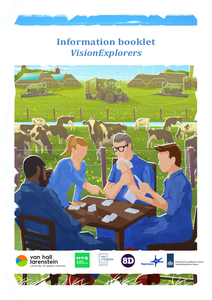Education for sustainable development (ESD) presents challenges to secondary science teachers. Characteristic aspects such as action-oriented teaching, stance-taking, interdisciplinary problem solving, and emotional and value-oriented teaching cause tensions for teachers accustomed to traditional science teaching. To help future science teachers face these challenges, understanding how these tensions are rooted in teaching visions is crucial. In the context of teacher education, this study aims to explain pre-service science teachers’ visions on these tension inducing aspects of ESD. Through a qualitative analysis of interviews and written reflections of ten participants in a course on ESD, we document beliefs and experiences that underlie their visions. A belief that supports teaching ESD is that education should contribute to a sustainable future. Prevalent beliefs that cause tensions with ESD are that education should not impose values; that one’s subject matter knowledge is insufficient; and that the scientific knowledge is unreliable. Experiences from the course that influence these beliefs, are confrontations with visions of peers, pupils, and professionals; exposure to ESD teaching practices; and inquiry into a socio-scientific issue, all of which alleviated tensions. Findings help teacher educators understand pre-service science teachers’ visions and provide suggestions for activities that foster vision development.
MULTIFILE
This research concerning the experience and future of zoos was carried out from 2011-2012 and takes regional ideas concerning Zoo Emmen as well as global visions into account. The research focuses partly on Zoo Emmen, its present attractions and visitors while also comparing and contrasting visions on the future in relationship to other international zoos in the world. In this way, remarkable experiences and ideas will be identified and in the light of them, it can serve as inspiration for stakeholders of zoos at large. The main research subject is a look at the future zoos in view of: The Zoo Experience – an international experience benchmark; The Zoo of the Future – a Scenario Planning approach towards the future; The virtual zoo - zoo’s in the internet domain.
DOCUMENT

MULTIFILE
Organizing entrepreneurial collaboration in small, self-directed teams is gaining popularity. The underlying co-creation processes of developing a shared team vision were analyzed with a core focus on three underlying processes that originate from the shared mental models framework. These processes are: 1) the emergence of individual visions and vision integration, 2) conflict solving, and 3) redesigning the emerging knowledge structure. Key in the analysis is the impact of these three processes on two outcome variables: 1)the perceived strength of the co-creation process, 2) the final team vision. The influence of business expertise and the relationship between personality traits and intellectual synergy was also studied. The impact of the three quality shared mental model (SMM) variables proves to be significant and strong, but indirect. To be effective, individual visions need to be debated during a second conflict phase. Subsequently, redesigning the shared knowledge structure resulting from the conflict solving phase is a key process in a third elaboration phase. This sequence positively influences the experienced strength of the co-creation process, the latter directly enhancing the quality of the final team vision. The indirect effect reveals that in order to be effective, the three SMM processes need to be combined, and that the influence follows a specific path. Furthermore, higher averages as well as a diversity of business expertise enhance the quality of the final team vision. Significant relationships between personality and an intellectual synergy were found. The results offer applicable insights for team learning and group dynamics in developing an entrepreneurial team vision. LinkedIn: https://www.linkedin.com/in/rainer-hensel-phd-8ba44a43/ https://www.linkedin.com/in/ronald-visser-4591034/
DOCUMENT

This guide is a useful tool for the VisionExplorers game. The guide explains different farm visions, success factors and measures. The guide also helps you to find measures that fit well with your company vision. In short, this guide provides additional explanation during and after playing the game.
DOCUMENT

This guide is a useful tool for the VisionExplorers game. The guide explains different farm visions, success factors and measures. The guide also helps you to find measures that fit well with your company vision. In short, this guide provides additional explanation during and after playing the game.
DOCUMENT

At the moment of writing of this article, mid-2018, the topic ‘blockchain’ was introduced in the real estate industry in the Netherlands about two years ago. Blockchain will have a large impact in the way we share information and make transactions. Its promise is big, interest in the topic and the number of experiments doubles each year, and not only in the Netherlands, but globally too. So you might expect the number of actual ‘blockchain products’ for the real estate market to follow the same exponential pattern.In reality, however, this is hardly the case at all. Does that mean there are barely any problems to which blockchain is the solution? Perhaps the problems do exist, but the market is not ready yet? And why not? The two most frequently asked questions in the real estate industry are the following: 1. How will blockchain change my business model?2. Where can I buy it so that I can employ it tomorrow?
MULTIFILE

More and more municipalities are, fortunately, working on play-friendly public spaces. However, many policy visions and investments are still based on assumptions made by municipal officials or suppliers of play equipment.
LINK
In hun bijdrage aan het boek Teacher education around the world. Changing policies and practices van Linda Darling-Hammond en Ann Liebermann, beschrijven Karen Hammerness, Jan van Tartwijk en Marco Snoek de praktijk van de lerarenopleidingen voor het voortgezet onderwijs in Nederland.
DOCUMENT